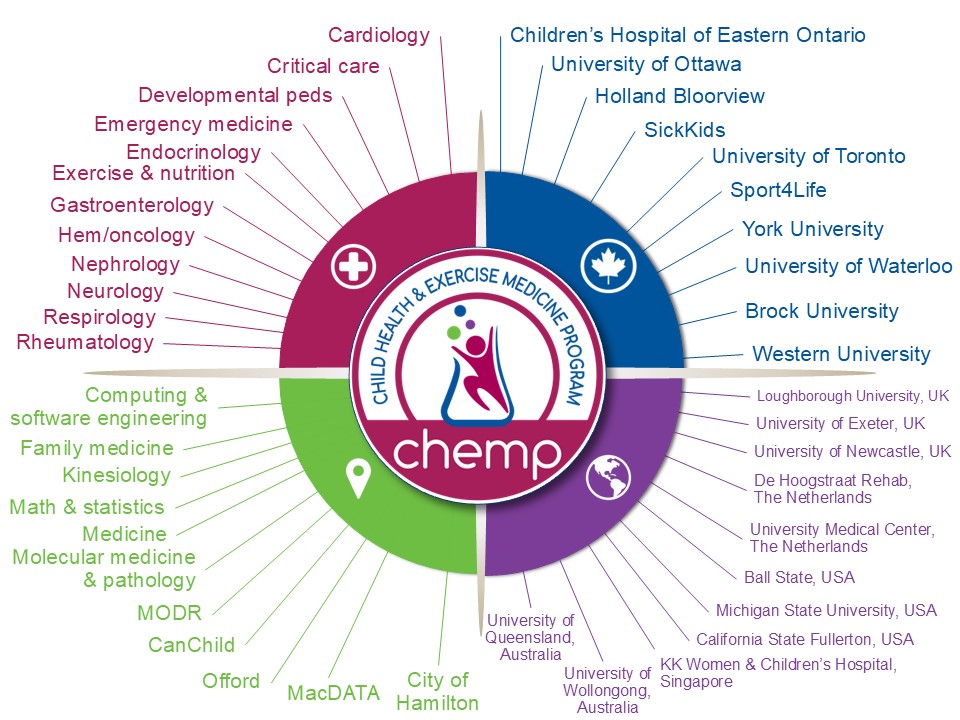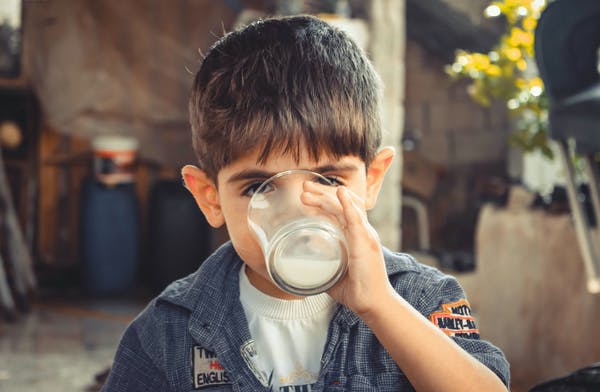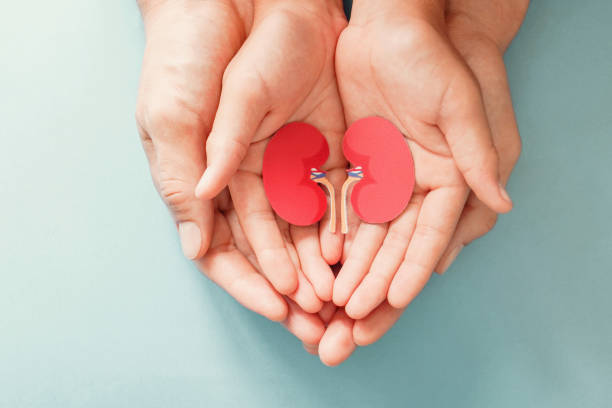Current CHEMP Studies
Please visit the study pages below for more information about our current projects and to learn about how you can participate in our research.
Information Box Group
Current Collaborations

Our research in exercise medicine sometimes overlaps and complements the research of other Labs. Often we will collaborate with other researchers, providing them with data we have gathered through our studies.
Here are some of our current Research Collaborations.
Expandable List
Physical activity during early childhood (<5 years), typically regarded as active play, is necessary to support young children’s
achievement of developmental milestones. Despite the importance of physical activity during early childhood, opportunities
to engage in this behaviour in childcare remain infrequent and under-valued. Early childhood educators (ECEs) are crucial for
supporting physical activity in this environment, as they have had a profound influence on children’s physical activity
opportunities. However, ECEs have reported low self-efficacy to lead physical activity in childcare, which they have
attributed to their limited training in this area. Inconsistencies in physical activity education exist across Canadian pre-service
ECE programs; as such, our team led the SSHRC-funded Training pre-service EArly CHildhood educators in physical
activity (TEACH) study to develop and implement an e-Learning course in physical activity with pre-service ECEs.
Full-scale implementation in 20 Canadian English-speaking ECE programs is underway; however, to
ensure equitable access to this professional learning opportunity for all Canadian pre-service ECEs, and to address the
imminent need for high-quality virtual learning in post-secondary programs due to COVID-19, translating and adapting the
course into French (TEACH-FR) and testing its effectiveness in a timely manner is necessary.
The goals of this study are to: i) Establish whether the TEACH-FR e-Learning course can increase French-speaking
pre-service ECEs’ physical activity self-efficacy, knowledge, and intentions (Primary Objectives) and ii) Explore the
feasibility, fidelity, and reach, of the course, and gather pre-service ECEs’ and instructors’ perspectives about the content and
delivery (Secondary Objectives).
Developmental Coordination Disorder (DCD) is a prevalent neurodevelopmental disorder affecting 5-6% of children. DCD is characterized by significant problems with fine and/or gross motor coordination that impair a child’s ability to perform many everyday tasks. Our research team has led the field internationally in understanding how this condition puts children at risk for inactivity and poor health-related fitness outcomes during mid-childhood through adolescence. Starting in 2013, our team successfully assembled a large cohort of 4- and 5-year-old children with probable DCD (pDCD) (total 589 children; 288 pDCD). We are requesting new funding to continue this unique cohort of children to examine their trajectories of physical activity (PA) as they transition from early to late-childhood and determine how psychosocial, behavioural and physical factors influence their risk of developing mental health problems.
The overall goal of the Coordination and Activity Tracking in Children II (CATCH II) continuation study is to determine if: 1) young children with pDCD are more likely to experience declines in PA, and increases in body weight over time; and 2) if changes in PA, health-related fitness, and psychosocial factors explain increased self-reported internalizing problems (depression/anxiety) as they transition to late-childhood.
We propose developing and evaluating a pediatric concussion management health platform available on mobile devices. The proposed platform will be based upon advanced ML methods applied to the management of recovery after concussion in youth. Based on previous findings of the applicants, the proposed system has the potential for significant improvements in concussion management over currently employed methods. The proposed project will bring about the ability for youth and their families along with clinicians to assess recovery and modify their activity to promote speedy recovery, prevent repeat injuries and prolonged symptom duration which will interfere with participation in normal activities and increase the possibility of developing devastating chronic symptoms along with depression, anxiety and academic failure.
Physical activity during early childhood (<5 years), typically in the form of active or energetic play experiences, is necessary to support young children’s achievement of developmental milestones. Despite the importance of physical activity during early childhood, opportunities to engage in this behaviour in childcare remain infrequent and under-valued. Early childhood educators are crucial for supporting physical activity in this environment, as they control a substantial portion of young children’s days and can profoundly influence physical activity opportunities within the childcare setting. However, early childhood educators have reported low self-efficacy to lead physical activity in childcare and have reported that this is due primarily to their limited post-secondary training in physical activity.
Inconsistencies in physical activity-related training and education exist across Canadian Early Childhood Education (ECE) diploma programs; as such, an innovative pedagogical approach is needed to ensure ECE candidates develop appropriate knowledge and self-efficacy in physical activity domains to be confident leading physical activity opportunities in childcare settings.
The goals of this study are to: i) Establish whether a physical activity e-Learning module increases ECE candidates’ physical activity-related self-efficacy (Objective #1) and knowledge (Objective #2); and, ii) Examine the acceptability, feasibility, and fidelity of module implementation; and gather ECE candidates’ use of, perspectives about, and experiences with the content and mode of delivery (Objective #3).
Completed Studies
Clinical Populations: Exercise Training
Nutrition & Performance
Early Years
Clinical Populations: Exercise and inflammation in children with chronic disease
Physical Activity in Chronic Health Conditions

Screen time and sedentary behaviours in children with chronic health conditions
Publications
Check out our most recent publications below.
2025 Publications

RESOURCES
2025 publications are in the works!
Archived Publications by Year
Expandable List
- Reliability of field- and laboratory-based assessments of health-related fitness in preschool-aged children
- A matched-pair analysis of gross motor skills of 3-to 5-year-old children with and without a chronic physical illness
- The Concussion, Exercise, and Brain Networks (ConExNet) study: A cohort study aimed at understanding the effects of sub-maximal aerobic exercise on resting state functional brain activity in pediatric concussion
- The efficacy of the TEACH e-Learning course at improving early childhood educators’ physical activity and sedentary behaviour self-efficacy, knowledge, intentions, and perceived behavioural control: A randomized controlled trial
- A web-based resource for exercise training in children treated for brain tumours to improve cognitive sequelae: Development and usability
- Fact or fiction: Accelerometry versus self-report in adherence to pediatric concussion protocols, A prospective longitudinal cohort study
- Developmental coordination disorder and early childhood trajectories of physical activity
- The Youth Fitness International Test (YFIT) battery for monitoring and surveillance among children and adolescents: A modified Delphi consensus project with 169 experts from 50 countries and territories
- Exploratory examination of the association between physical-mental multimorbidity and physical activity in children
- Sex-specific differences in resting-state functional brain activity in pediatric concussion
- Physical activity trajectories in early childhood: Investigating personal, environmental, and participation factors
- 24-hour movement guideline adherence and mental health: A cross-sectional study of emerging adults with chronic health conditions and disabilities
- Physical activity in pediatric inflammatory bowel disease: A scoping review
- A pilot study of exercise training for children and adolescents with inflammatory bowel disease: An evaluation of feasibility, safety, satisfaction, and efficacy
- New insights into accelerometer-measured physical activity and sedentary time during early recovery in pediatric concussion
- Optimizing an exercise training program in pediatric brain tumour survivors: Does timing post-radiotherapy matter?
- Inactive lifestyles among young children with innocent murmurs or congenital heart disease, regardless of disease severity or treatment
- Prevalence and correlates of physical-mental multimorbidity in outpatient children from a pediatric hospital in Canada
- Change in pre- and in-service early childhood educators’ knowledge, self-efficacy, and intentions following an e-learning course in physical activity and sedentary behavior: A pilot study
- Preschool to school-age physical activity trajectories and school-age physical literacy: a longitudinal analysis
- Implementation of an e-Learning course in physical activity and sedentary behaviour for pre- and in-service early childhood educators: Evaluation of the TEACH pilot study
- Training pre-service EArly CHildhood educators in physical activity (TEACH): Protocol for a quasi-experimental study
- Associations between fitness, physical activity and fatness in pre-school children with typical and atypical motor coordination
- Correlates of moderate-to- vigorous physical activity in children with physical illness and physical-mental multimorbidity
- APNM-2022-Exploring the relationship between resting-state intra-network connectivity and accelerometer-measured physical activity in pediatric concussion_ a cohort study
- JSportsSci-2022-Association between childcare movement behaviour compositions with health and development among preschoolers-Finding the optimal combinations of physical activities and sedentray time
- Physical activity and sedentary behaviour of Canadian children aged 3 to 5.
- Energy substrate utilization with and without exogenous carbohydrate intake in boys and men exercising in the heat.
- No difference in exogenous carbohydrate oxidation during exercise in children with and without impaired glucose tolerance.
- Thermoregulation in boys and men exercising at the same heat production per unit body mass.
- Circulating Endothelial Progenitor Cells in Youth: Fitness, Physical Activity and Adiposity.
- Supporting Physical Activity in the Childcare Environment (SPACE): rationale and study protocol for a cluster randomized controlled trial.
- Tracking of physical activity and fitness during the early years.
- Comparing the Actical and ActiGraph Approach to Measuring Young Children’s Physical Activity Levels and Sedentary Time.
- The Effect of Acute Exercise on Neutrophil ROS Production and Inflammatory Markers in Healthy Pre-Pubertal and Adult Males.
- The Coordination and Activity Tracking in CHildren (CATCH) study: rationale and design.
- Associations of non-invasive measures of arterial structure and function, and traditional indicators of cardiovascular risk in adults with cerebral palsy
- Descriptive data on cardiovascular and metabolic risk factors in ambulatory and non-ambulatory adults with cerebral palsy.
- In-Bed Mobilization in Critically Ill Children: A Safety and Feasibility Trial.
- Effects of acute exercise on circulating endothelial and progenitor cells in children and adolescents with juvenile idiopathic arthritis and healthy controls: a pilot study.
- The Effect of Post-Exercise Milk Protein Intake on Rehydration of Children.
- Effects of Short-Term Exercise Training With and Without Milk Intake on Cardiometabolic and Inflammatory Adaptations in Obese Adolescents.
- Nutritional Considerations for the Overweight Young Athlete.
- Exertion testing in youth with mild traumatic brain injury/concussion.
- Effects of acute exercise on markers of inflammation in pediatric chronic kidney disease: a pilot study.
- Functional Recovery Following Critical Illness in Children: The “Wee-Cover” Pilot Study.
- Fitness and physical activity in youth with Type 1 Diabetes Mellitus in good or poor glycemic control.
- Sedentary time and screen-based sedentary behaviours of children with a chronic disease.
- Quantification of physical activity and sedentary time in adults with cerebral palsy.
- Measurement of habitual physical activity and sedentary behaviour in youth with cerebral palsy: Work in progress.
- Post-exercise protein ingestion increases whole body net protein balance in children.
- Effects of post-exercise milk consumption on whole body protein balance in youth.
- Effect of milk consumption on rehydration in youth following exercise in the heat.
- Markers of biological stress and mucosal immunity during a week leading to competition in adolescent swimmers.
- The effects of resting and exercise serum from children with cystic fibrosis on C2C12 myoblast proliferation in vitro.
- Are we driving our kids to unhealthy habits?? Results of the Active Healthy Kids Canada 2013 Report Card on Physical Activity for Children and Youth.
- Results from Canada’s 2014 Report Card on Physical Activity for Children and Youth.
- Objectively measured sedentary time in youth with cerebral palsy compared with age-, sex-, and season-matched youth who are developing typically: An explorative study.
- Objectively-measured physical activity levels of young children with congenital heart disease.
- “Wii-Hab” in critically ill children: A pilot study.
- Application of stable isotope tracers in the study of exercise metabolism in children: a primer.
- Circulating endothelial cells in children: Role of fitness, activity and adiposity.
- Reduced fat oxidation rates during submaximal exercise in boys with cystic fibrosis.
- Mild to moderate hypohydration reduces boys’ cycling performance in the heat.
- Self-efficacy and the physical activity behaviour of children with Developmental Coordination Disorder.
Trainee Presentations
Video Presentations

Exercise Messengers Video
This video was created by CHEMP alumnus Dr. Yasmeen Mezil as part of her doctoral thesis.
Exercise Messengers - Video

Effect of accelerometer epoch length on physical activity and sedentary time in toddlers Video
This video was created by Elyse Letts for the ICAMPAM22 conference.
Effect of accelerometer epoch length on physical activity and sedentary time in toddlers - Video
McMaster Child Health Research Day 2024

Muscle Strength and Cardiorespiratory Fitness in Children with a Chronic Inflammatory Disease View Poster
This poster was created by Zahra Ali, an undergraduate thesis student with CHEMP. Findings from her thesis project were shared at the 2024 McMaster Child Health Research Day (MCHRD).

Balancing Act: Investigating the Effects of Trikafta Therapy on Bone Health in Pediatric Cystic Fibrosis View Poster
This poster was created by Sarah Allam, an undergraduate project student with CHEMP. Sarah’s project proposal was shared at the 2024 McMaster Child Health Research Day (MCHRD).

Exploring the Relationship Between Submaximal and Maximal Aerobic Fitness and Glycemic Control in Youth with Type 1 Diabetes Mellitus View Poster
This poster was created by Rachel Belmont, an undergraduate thesis student with CHEMP. Findings from her thesis project were shared at the 2024 McMaster Child Health Research Day (MCHRD).

Assessing Respiratory Response to Aerobic Exercise in Concussion View Poster
This poster was created by Ben Caputo, an undergraduate project student with CHEMP. Findings from his project were shared at the 2024 McMaster Child Health Research Day (MCHRD).

Examining the Effects of Trikafta therapy on health-related fitness, physical activity and quality of life in children with cystic fibrosis View Poster
This poster was created by Sarah da Silva, a research assistant with CHEMP. Sarah’s project proposal was shared at the 2024 McMaster Child Health Research Day (MCHRD).

Day-to-Day Variability in Well-Being and Physical Activity in Children with Inflammatory Bowel Disease View Poster
This poster was created by Ben Domerchie, an undergraduate thesis student with CHEMP. Findings from his thesis project were shared at the 2024 McMaster Child Health Research Day (MCHRD).

Exercise & Quality of Life in Children with Chronic Conditions View Poster
This poster was created by Sarah Gillies, an undergraduate thesis student with CHEMP. Findings from her thesis project were shared at the 2024 McMaster Child Health Research Day (MCHRD).

Assessing Gait Variability in Adolescent Concussions: A Submaximal Aerobic Exercise Study View Poster
This poster was created by Mabel Koo, an undergraduate thesis student with CHEMP. Findings from her thesis project were shared at the 2024 McMaster Child Health Research Day (MCHRD).

Cardiac autonomic function in children with inflammatory bowel disease and healthy children View Poster
This poster was created by Aydin Lim, an undergraduate thesis student with CHEMP. Findings from his thesis project were shared at the 2024 McMaster Child Health Research Day (MCHRD).

MOvement behaviours and health indicators in children with a chronic MEdical condition or disability: an iNTernational mUlticentre prograM (MOMENTUM): Exploring chronic condition-specific physical activity recommendations (CSPRs) and the value of Personalized Exercise Plans (PEPs) View Poster
This poster was created by Ethan Parikh, an undergraduate project student with CHEMP. Findings from his project were shared at the 2024 McMaster Child Health Research Day (MCHRD).

Investigating Thermoregulation and Heat Tolerance in Prepubescent Girls as Compared to Boys View Poster
This poster was created by Sofia Panziera, an undergraduate thesis student with CHEMP. Findings from her thesis project were shared at the 2024 McMaster Child Health Research Day (MCHRD).

Exploring IL-6 Mediated Effects of Exercise on Children with Chronic Inflammatory Disorders View Poster
This poster was created by Sabrina Sefton, an undergraduate thesis student with CHEMP. Sabrina shared her project proposal at the 2024 McMaster Child Health Research Day (MCHRD).

Exploring the Relationship between inflammation and endothelial function in children with cystic fibrosis and healthy controls View Poster
This poster was created by Addy Wood, an undergraduate thesis student with CHEMP. Findings from her thesis project were shared at the 2024 McMaster Child Health Research Day (MCHRD).

The Oxygen Uptake Efficiency Slope in Children with Inflammatory Bowel Disease and Juvenile Idiopathic Arthritis View Poster
This poster was created by Arta Yamini, an undergraduate thesis student with CHEMP. Findings from her thesis project were shared at the 2024 McMaster Child Health Research Day (MCHRD).

Development of the MOMENTUM study: Movement Behaviours and Health Indicators in Children with a Chronic Medical Condition or Disability View Poster
This poster was created by Leili Hadayeghi, a Master’s student with CHEMP. Leili shared her research proposal at the 2024 McMaster Child Health Research Day (MCHRD).

Examining Barriers to Physical Activity in Pediatric Inflammatory Bowel Disease View Poster
This poster was created by Sam Morin, a Doctoral student with CHEMP. Sam shared findings from her project at the 2024 McMaster Child Health Research Day (MCHRD).

 to understand the exercise-health connection. We aim to generate knowledge that can serve as the basis for public health policies and standards of clinical care that promote exercise as medicine.
to understand the exercise-health connection. We aim to generate knowledge that can serve as the basis for public health policies and standards of clinical care that promote exercise as medicine. 















